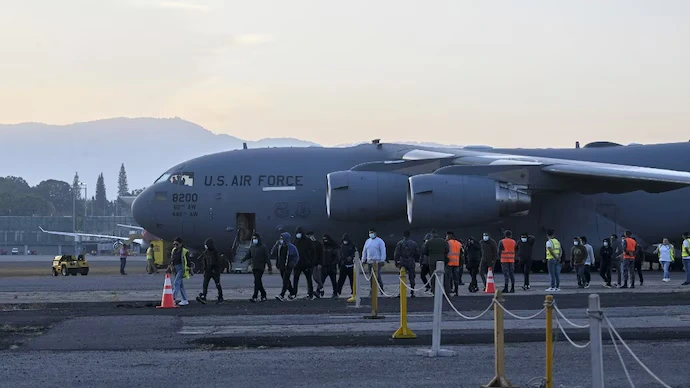Amritsar, India – February 6, 2025
A US military plane, a Boeing C-17 Globemaster III, landed in Amritsar, Punjab, on Wednesday morning, carrying 104 deported Indian nationals. The flight, originating from San Antonio, Texas, with a stopover in Germany, marked a significant escalation in the U.S. efforts to combat ‘irregular migration’ and heightened the already complex immigration relationship between India and the U.S. Under former President Donald Trump’s administration, strict immigration enforcement policies had already set the tone for such deportations, which continue under President Joe Biden’s tenure, with increasing attention to the role of military resources in repatriation efforts.
Details of Immigrants
The passengers onboard were primarily from the northern states of Punjab, Gujarat, and Haryana, many of whom had been living in the U.S. for extended periods. According to U.S. immigration officials, the deportees had violated various immigration laws, including overstaying their visas or entering the U.S. without legal documentation. The use of a US military plane for such deportations underscores the growing role of military resources in the U.S. government’s immigration enforcement efforts.
Addressing ‘Irregular Migration’
The timing of this deportation coincides with a series of diplomatic efforts led by U.S. lawmakers, including Senator Marco Rubio, to address concerns over ‘irregular migration’ between India and the United States. In a meeting held last week in Washington, Rubio, a vocal advocate for stricter immigration controls, met with India’s Foreign Minister Subrahmanyam Jaishankar. The discussion centered on managing migration flows and ensuring both nations are working together to combat illegal immigration.
Rubio emphasized the United States’ desire to tackle the issue of irregular migration head-on, noting that illegal migration not only strains American resources but also complicates diplomatic relations. He suggested that closer cooperation between the U.S. and India on immigration enforcement is essential, especially considering the rising numbers of undocumented Indian immigrants in the U.S. This pressure is likely to result in further deportations via US military plane, including possible future flights with similar cargos.
Minister Jaishankar, while acknowledging the need for better cooperation, reiterated India’s stance on ensuring that migration follows legal channels. He underscored that India has always been committed to facilitating legal migration and was willing to work with the U.S. to streamline deportation processes, including facilitating the use of U.S. military plane for repatriations while safeguarding the welfare of returnees.
The Quad Foreign Ministers Meet
At the same time, the Quad Foreign Ministers’ meeting in Washington, D.C., discussed regional security and migration challenges. U.S. Secretary of State Antony Blinken stressed the importance of Quad cooperation in managing migration flows, with US military plane possibly playing a role in addressing irregular migration in the Indo-Pacific. Jaishankar also addressed migration concerns, underscoring the Quad’s focus on transnational issues and international law.
Reactions to the Deportations
The US military plane arrival with deported immigrants has sparked mixed reactions. Supporters of the U.S. policy argue that deportations are necessary to uphold border integrity, while critics highlight the humanitarian challenges, as many deportees had lived in the U.S. for years and face difficulties reintegrating into India. Indian advocacy groups have raised concerns about the rushed deportation process and lack of support for returnees.
Looking Ahead: Diplomatic Tensions and Cooperation
The deportations highlight growing diplomatic tensions between the U.S. and India, though both nations have expressed a willingness to cooperate on immigration. Future discussions are expected to focus on improving deportation processes and better supporting returnees. Cooperation within the Quad framework is likely to continue, addressing irregular migration and regional stability. The use of US military plane for deportations will remain a key issue, as both nations navigate the complexities of global migration. The legacy of Trump’s tough stance on immigration continues to influence these ongoing debates, with both countries exploring ways to balance enforcement with humanitarian concerns.
Conclusion
The arrival of the US military plane carrying 104 deported Indian nationals in Amritsar underscores the growing complexities of immigration relations between the United States and India. The use of a US military plane for such deportations reflects the U.S. government’s continued focus on controlling illegal migration, a policy path that was firmly established during the Trump administration and is still being pursued under President Biden. While the U.S. military plane serves as a tool for enforcing immigration policies, it also raises important humanitarian concerns regarding the reintegration of deportees into India.

